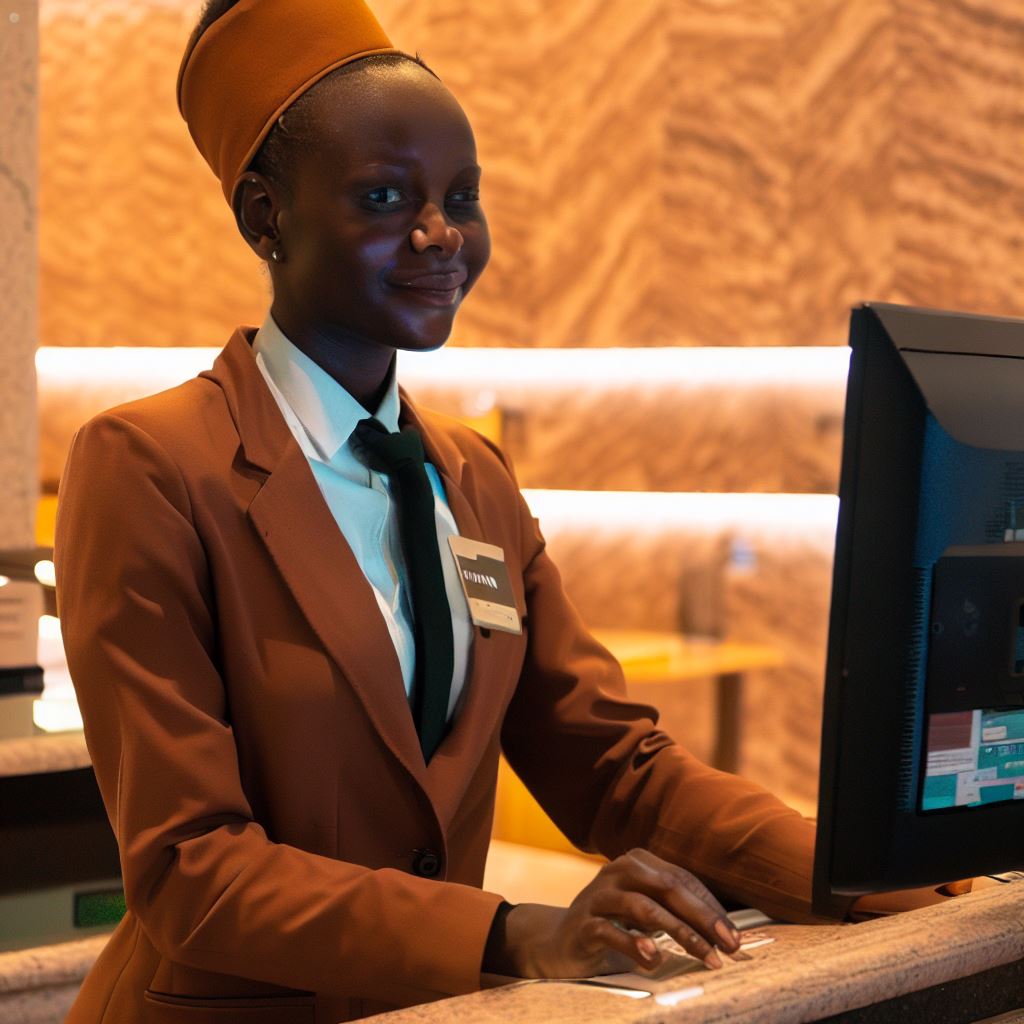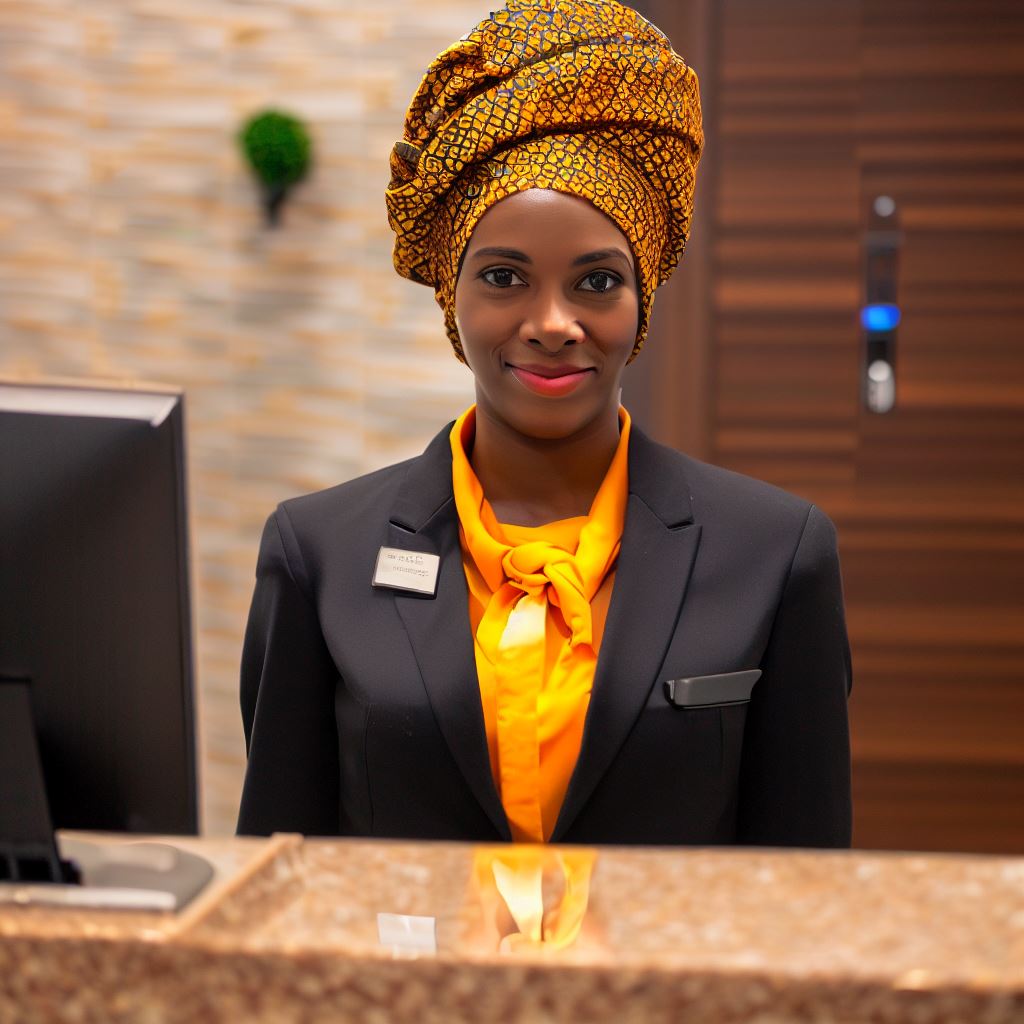Introduction
Technology in Hotel Reception
Technology in hotel reception is revolutionizing the hospitality sector. It’s reshaping how guests experience their stay.
Importance in the Hospitality Industry
In the modern world, technology isn’t just an option; it’s a necessity for hotels to thrive.
It enhances efficiency and guest satisfaction.
The Nigerian Perspective
Nigeria, a vibrant hub of hospitality, is embracing tech in reception.
This section explores the Nigerian hospitality industry’s tech-driven evolution.
Traditional Hotel Reception in Nigeria
Traditional hotel reception methods
- Traditional hotel reception in Nigeria heavily relies on manual processes.
- Guests are required to fill out physical registration forms upon arrival.
- The check-in process involves staff manually entering guest details into a register.
- Payments are mostly done in cash, requiring the need for manual cash handling and reconciliation.
- Room assignments are often written down on a physical record, making it prone to errors.
- There is little to no use of technology in managing reservations and guest information.
- The communication between different hotel departments is primarily done through paper forms and memos.
- Guest requests are often noted down manually and passed on to the relevant departments.
- Traditional hotel reception methods lack real-time visibility and efficiency.
Challenges faced by Nigerian hotels without technology
- Manual processes are time-consuming, leading to longer check-in and check-out times.
- Managing a large number of guest records manually can result in errors and misplaced information.
- Cash handling increases the risk of theft or miscounting of funds.
- Without a centralized reservation system, double booking and overbooking can occur.
- Lack of real-time information hinders staff’s ability to provide quick and efficient service to guests.
- Communication gaps can happen between departments, impacting guest requests and overall experience.
- Limited data analysis capabilities make it challenging to make informed business decisions.
- Traditional methods offer limited guest personalization and customization options.
- Guests may perceive a lack of professionalism and technological advancement in the hotel’s operations.
Impact on customer experience
- Longer check-in and check-out times may lead to guest frustration and dissatisfaction.
- Errors and misplaced information can result in guest inconvenience and dissatisfaction.
- Inaccurate cash handling may create distrust and negatively affect the hotel’s reputation.
- Double booking and overbooking can cause guest inconvenience and dissatisfaction.
- Failure to provide quick and efficient service can lead to guest dissatisfaction and negative reviews.
- Communication gaps can lead to delayed or unfulfilled guest requests, impacting their experience.
- Difficulty in making informed decisions may result in ineffective strategies and reduced guest satisfaction.
- Limited personalization options may result in guests feeling less valued and important.
- A lack of technological advancement perception may discourage tech-savvy guests from choosing the hotel.
Basically, traditional hotel reception methods in Nigeria heavily rely on manual processes, leading to several challenges and negative impacts on the customer experience.
The use of technology can significantly improve efficiency, accuracy, and overall guest satisfaction.
Read: A Day in the Life of a Hotel Receptionist in Nigeria
Benefits of Technology in Hotel Reception
Streamlining check-in and check-out processes
- Implementing technology in hotel reception can significantly speed up the check-in and check-out processes.
- Automated systems allow guests to complete necessary paperwork quickly and easily, reducing waiting time.
- Guests can use self-check-in kiosks, which are convenient and eliminate the need for manual interaction.
- Electronic keycards can be issued instantly, enabling guests to access their rooms without any delays.
- By streamlining these processes, hotels can provide a seamless experience to their guests.
Enhancing communication and efficiency
- Integrating technology in hotel reception improves communication between staff members and departments.
- Real-time updates and notifications can be sent to housekeeping, maintenance, and other relevant staff.
- Efficient communication ensures prompt response to guest requests, leading to enhanced overall efficiency.
- Technology also allows for easier coordination of tasks among different hotel departments.
- With improved communication and efficiency, hotel staff can provide better service to their guests.
Improving customer service and guest satisfaction
- Technology plays a vital role in enhancing customer service and maximizing guest satisfaction.
- With the help of customer relationship management (CRM) systems, hotels can personalize guest experiences.
- Guest preferences, such as room temperature or food choices, can be recorded and used to tailor services.
- Automated systems can track guest feedback, allowing hotels to promptly address any issues or concerns.
- Technology enables hotels to offer personalized recommendations and promotions based on guest history.
- By focusing on improving customer service, hotels can build a strong reputation and increase guest loyalty.
Adopting technology in hotel reception brings numerous benefits to both guests and hotel staff.
Streamlining check-in and check-out processes, enhancing communication and efficiency, and improving customer service and guest satisfaction are among the advantages.
Nigerian hotels should embrace technology to stay competitive and provide a seamless and personalized experience to their guests.
Read: Key Skills Needed for a Hotel Receptionist in Lagos
Existing Technological Solutions in Nigerian Hotels
Overview of technology adopted by some Nigerian hotels
- Nigerian hotels have embraced various technological solutions to enhance their reception services.
- They have implemented modern check-in and check-out systems to expedite the process.
- Nigerian hotels have adopted keyless entry systems, allowing guests to access their rooms using smartphones.
- Many hotels have integrated customer relationship management (CRM) software to streamline guest interactions.
- In-room technologies such as smart TVs, voice-activated assistants, and mobile control panels are becoming common.
- Some hotels have deployed mobile apps that allow guests to make requests, access information, and provide feedback.
Examples of successful implementation and positive outcomes
- A prominent Nigerian hotel implemented a self-check-in kiosk, reducing check-in time by 50% and enhancing guest satisfaction.
- Another hotel introduced an automated concierge service, allowing guests to get real-time information and book services.
- The adoption of CRM software by a luxury hotel resulted in personalized guest experiences and improved staff efficiency.
- A boutique hotel integrated mobile room control panels, enabling guests to customize their room settings effortlessly.
- Several hotels partnered with local travel platforms, enabling seamless online booking and attracting tech-savvy travelers.
Case studies from Nigerian hotels
- Hotel X, located in Lagos, implemented a digital guest experience platform, resulting in increased guest engagement and loyalty.
- Hotel Y in Abuja introduced an AI-powered chatbot, reducing front desk inquiries and improving response time.
- Hotel Z in Port Harcourt integrated facial recognition technology for check-ins, ensuring a smooth and secure process for guests.
- Hotel A in Calabar implemented a real-time translation service, enhancing communication with international guests.
- Hotel B in Enugu adopted an intelligent revenue management system, optimizing pricing and increasing profitability.
Generally, Nigerian hotels have leveraged technology to revolutionize their reception services.
From self-check-in kiosks to keyless entry systems, these innovations have enhanced guest experiences and improved operational efficiency.
The successful implementation of technology in Nigerian hotels has yielded positive outcomes, including increased guest engagement, personalized services, and streamlined operations.
Case studies from various Nigerian hotels showcase the diverse range of technological solutions being embraced in the industry.
As technology continues to advance, Nigerian hotels will undoubtedly explore and adopt more innovative solutions to stay competitive in the global hospitality landscape.
Read: The Salary Guide for Hotel Receptionists in Nigeria

Challenges and Limitations of Adopting Technology in Nigerian Hotels
Incorporating technology in Nigerian hotels comes with its fair share of challenges and limitations.
While technology has the potential to revolutionize hotel reception and enhance guest experiences, several factors hinder its adoption and implementation.
Connectivity and infrastructure issues
Connectivity and infrastructure issues are major hurdles in utilizing technology in Nigerian hotels.
Limited access to reliable and high-speed internet connections impedes the successful integration of tech systems.
Additionally, inadequate infrastructure, including power outages and unstable electricity supply, further complicates the functioning of technology.
Poor network coverage and signal strength in remote areas pose connectivity challenges, hindering the smooth operation of technological solutions.
Furthermore, the lack of proper IT infrastructure within hotels makes it difficult to integrate and maintain technological systems effectively.
Cost implications and budget constraints
Another significant challenge is the cost implications and budget constraints associated with adopting technology in Nigerian hotels.
Implementing technology requires substantial upfront costs for purchasing software, hardware, and necessary equipment.
Moreover, training staff on the usage of technology can be a costly affair.
Regular maintenance and upgrading of technology also demand additional financial resources.
Budget constraints may prevent hotels from investing in new technology, putting them at a disadvantage compared to their technologically advanced competitors.
Staff training and resistance to change
Staff training and resistance to change present additional obstacles in the adoption of technology in Nigerian hotels.
Existing staff may lack the necessary technical skills and knowledge to operate new technology effectively.
Training staff on technology usage can be a time-consuming and expensive process, further straining resources.
Resistance to change and fear of job loss contribute to the hesitancy in embracing technology, limiting its successful adoption.
Additionally, cultural and generational differences can result in resistance from older staff members who may be less inclined to adapt to new technological practices.
How to Overcome the Challenges
Overcoming these challenges and limitations requires proactive measures and strategic planning.
Nigerian hotels can collaborate with internet service providers to improve connectivity and address infrastructure issues.
They can invest in backup power systems to counteract electricity supply problems.
Hotels should also allocate sufficient resources for staff training, ensuring that employees have the necessary skills to utilize technology effectively.
To address resistance to change, hotel management should communicate the benefits of technology and involve staff in the decision-making process.
Additionally, creating a supportive and inclusive work environment will help overcome cultural and generational barriers to technology adoption.
Essentially, while the adoption of technology in Nigerian hotels has numerous advantages, challenges and limitations must be acknowledged and addressed.
Connectivity and infrastructure issues, cost implications, and staff training and resistance to change act as barriers to the successful implementation of technology.
By actively addressing these challenges, Nigerian hotels can harness the power of technology to improve guest experiences and gain a competitive edge in the hospitality industry.
Read: Hotel Receptionist: A Flourishing Career in Nigeria?
Recommendations and Best Practices
Assessing the hotel’s individual needs and budget
- Conduct a thorough analysis of the hotel’s specific requirements and constraints.
- Determine the available budget for implementing technology solutions in the reception area.
- Take into account factors such as hotel size, occupancy rate, and target clientele.
- Identify areas where technology integration can enhance guest experience and streamline operations.
Finding suitable technology solutions for Nigerian hotels
- Research and explore different technology options that align with the hotel’s needs.
- Consider software solutions for front desk management, online booking, and guest relationship management.
- Evaluate hardware options like self-check-in kiosks, digital signage, and mobile concierge apps.
- Choose scalable systems that can be easily upgraded as the hotel expands or new needs arise.
Employee training and support
- Provide comprehensive training programs to familiarize staff with the implemented technologies.
- Ensure that employees understand how to effectively use the system and troubleshoot common issues.
- Offer ongoing support and periodic refresher training sessions to keep employees up-to-date with any updates or changes.
- Encourage an open communication culture, where staff can provide feedback and suggest improvements.
By following these recommendations and best practices, Nigerian hotels can leverage technology to improve their reception areas, enhance guest satisfaction, and boost operational efficiency.
It is essential for hotels to prioritize assessing their individual needs and budgets to avoid overspending or underutilizing technology.
Engaging in thorough research and exploring suitable technology solutions will ensure that the chosen systems align with the unique requirements and expectations of the Nigerian hospitality market.
Moreover, employee training and support play a vital role in successful technology implementation.
Equipping staff with the necessary skills and knowledge will empower them to provide exceptional service and troubleshoot any technological challenges that may arise.
Continuous support and open communication channels will also foster a positive work environment and drive innovation in the reception department.
Future Trends and Innovations in Technology for Hotel Reception
The future of technology in hotel reception holds immense potential for Nigerian hotels.
Emerging technologies such as artificial intelligence, robotics, internet of things, virtual reality, chatbots, and voice assistants are revolutionizing the hospitality industry globally.
Nigerian hotels can leverage these innovations to enhance their operations and deliver exceptional guest experiences.
Emerging technologies in the hospitality industry
1. Artificial intelligence (AI)
Artificial intelligence (AI) is reshaping the way hotels interact with guests.
From personalized recommendations to predictive analytics, AI can analyze vast amounts of data to understand guest preferences and provide tailored services.
Chatbots and voice assistants powered by AI enable quick and efficient customer service, automating routine tasks and freeing up staff for more complex guest interactions.
Robotics is another emerging technology with the potential to transform hotel reception in Nigeria.
Automated check-ins streamline the arrival process, minimizing waiting times and improving guest satisfaction.
Robotic concierges can provide information about local attractions, recommend restaurants, and even deliver amenities to guest rooms, enhancing convenience and efficiency.
The Internet of Things (IoT) offers exciting possibilities for Nigerian hotels.
IoT-enabled devices can be used to customize room settings according to guest preferences, such as temperature and lighting.
Hotels can monitor energy usage and make adjustments for improved efficiency, leading to cost savings and environmental sustainability.
2. Virtual reality (VR)
Virtual reality (VR) is revolutionizing the way guests explore and experience hotels.
Nigerian hotels can provide virtual tours of their facilities, allowing prospective guests to have a realistic and immersive preview before making a reservation.
VR can also be utilized in conference and event planning, enabling clients to visualize and customize spaces remotely.
To fully embrace these emerging technologies, Nigerian hotels need to adapt and stay updated.
Investing in technology infrastructure and providing adequate training for staff are essential for successful integration.
Hotels should stay abreast of industry trends by attending technology-focused conferences and networking with experts in the field.
Collaborating with technology providers is crucial for Nigerian hotels to customize solutions that meet their specific needs.
By working closely with developers, hotels can design technology systems that cater to the unique requirements of the Nigerian hospitality market.
3. Regular system updates and upgrades
Regular system updates and upgrades are vital to stay competitive.
By continuously improving their technology infrastructure, hotels can offer the latest advancements, ensuring a seamless guest experience.
Proactive adoption of new technologies will help Nigerian hotels stay relevant and meet the evolving expectations of tech-savvy travelers.
The future of technology in hotel reception is bright for Nigerian hotels.
By embracing emerging technologies and staying updated, Nigerian hotels can transform their operations, boost guest satisfaction, and compete effectively in the global hospitality market.
Conclusion
Technology plays a crucial role in the success of hotel reception. It enhances efficiency, improves guest satisfaction, and streamlines operations.
Nigerian hotels, however, face unique challenges in adopting and implementing technology due to infrastructure limitations and cost constraints.
Despite these challenges, Nigerian hotels should strive to embrace technology to stay competitive in the industry.
By investing in modern solutions such as online booking systems, mobile check-in/out, and guest management software, hotels can enhance their service quality, attract more guests, and increase revenue.
It is essential for Nigerian hotels to recognize the need for sustainable growth and adapt to the changing demands of the modern traveler.
By embracing technology, hotels can improve their operations, provide personalized experiences, and stay ahead in a highly competitive market.
With the growing emphasis on digitalization and tech-driven solutions, Nigerian hotels should actively seek partnerships with technology providers and explore innovative ways to implement technology in their reception processes.
In a nutshell, technology is not just a trend but a necessity for Nigerian hotels to thrive.
By leveraging technology, Nigerian hotels can overcome challenges, meet customer expectations, and position themselves as leaders in the hospitality industry.




